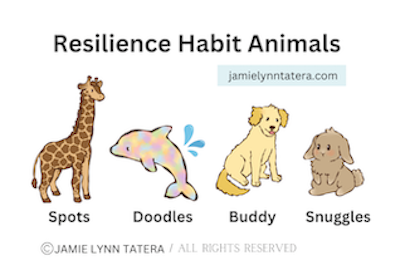Personal disclosure: last week I spent a lot of time beating myself up internally. The reason was pretty innocent: I have been doing a lot of teaching lately, which has left little time for other aspects of my work (like writing this newsletter). Because investing time in helping people discover my work is very important to me (I can only help parents help kids if I can expand my reach), my inner critic was saying unkind things about my time limitations.
To make matters worse, I am a SELF-COMPASSION teacher. Yes, the self-compassion teacher was beating the bananas out of herself internally. This could easily become a shame spiral, but luckily I do have a self-compassion practice that reminds me that everyone beats themselves up sometimes (even self-compassion teachers).
Now that I am somewhat on the other side, I will share with you the tools I used to respond to my intense self-criticism. And I’ll use the Resilience Habit Animals to describe my process (I use the animals when I teach kids, but they are great for grown-ups, too!). If you didn’t yet read my article on the Resilience Habit Animals, you can do so now for a little background.

Spots the Mindful Giraffe
So, my first step was to “spot” that I was beating myself up. This might seem obvious, but there’s a big difference between being stuck in the drama of beating myself up, and being the observer. The Spots habit is being the observer. I had to see clearly that I was being unkind to myself. I also noticed that I was feeling sad because instead of feeling happy about all of the teaching I’m doing (a great opportunity for soaking in joy), I was feeling stressed and criticized. Ugh!
Doodles the Helpful Dolphin and Buddy the Dog
The inner critic can be a tricky inner part to contend with because it’s laced with shame. I don’t like to deal with shame on my own, so I called a friend. I told her what was happening. This is a combo of the Doodles the Dolphin habit—I took a helpful action, and the Buddy habit. Calling a friend quite literally made me not alone. I also practiced the Buddy habit when I reminded myself that everyone beats themselves up sometimes (even self-compassion teachers).
Understanding the Critic
My conversation with my friend made a lot of things clearer. Truthfully, my friend didn’t say a lot to me, but she gave me space to explore the motivations of my inner critic.
Here’s what I discovered: my inner critic was beating me up relentlessly because this part of me felt very scared. I’ll be doing a lot of teaching for the next few months, and my critic is afraid that I’m not doing the right things to let people know about the Quest for Self-Compassion Workbook that will be coming out in October. I’ll spare you the details, but there’s a lot that goes into spreading the word, and my primary job for the next few months is to teach in schools and online. My inner critic does not want to accept time limitations. You can see my post on being finite; time limitations is something my inner critic refuses to accept.
Snuggles the Bunny
Once I really understood the critic, I actually felt a little compassion for it. Even though it was beating me up, its motivations were good. That being said, it was still beating me up! I gave myself compassion because it’s hard when the critic is active. I know I’m not the only person who suffers with this. I also know that trying to make the critic’s voice go away is unhelpful. What we resist persists.
But, I don’t have to let the inner critic’s voice be the only voice. After I got off the phone with my friend, I spent two minutes saying kind and encouraging words to myself. And I decided that I would do this each day for the next week. Truthfully, I forgot yesterday, but I did talk to myself kindly for two minutes again today. Two minutes might not sound like a lot, but go ahead and set a timer and try it. I told myself things like, “You’re doing great” (it’s true!), and “It’s okay to prioritize teaching right now and let other things wait until I have more time.” I asked myself what I might say to a friend, and I said those things to myself. And when I ran out of things to say, I repeated the same things again. The inner critic is usually a negative message on repeat, so it’s absolutely okay to repeat the same nice things over and over again.
Growing the Voice of Kindness
Moving forward I will likely continue to experience the voice of the critic because the critic has a really hard time understanding time limitations, and the critic really values aspects of my work that I don’t have much time for right now. But I don’t have to deal with the critic alone (I can talk about it with my trusted people), and I can also intentionally practice my kind, understanding voice each day.
If you’ve got a strong inner critic, please know that you are not alone. The critic is often a misguided inner voice with a positive intention to motivate us with a host of unhelpful strategies. We can name it, share about it with others, and we can grow a second, kinder voice.
Mindful Self-Compassion – 20% off online MSC in February!
I have learned to deal with my inner critic through taking and teaching Mindful Self-Compassion (MSC) training. If you haven’t yet taken MSC training, I’ll be teaching a live-online class through the Center for MSC that starts next week.
I’m also offering a special 20% discount on my self-paced online MSC class during the month of February (use the coupon code loveFeb) because you deserve to learn to treat yourself with love and kindness! Visit https://jamielynntatera.com/mindful-self-compassion-training/ to register or learn more about Mindful Self-Compassion training.
With Love,
Jamie Lynn
P.S. Here’s a photo of my 15-year-old daughter and me hiking together. It was so beautiful!

Thanks for reading my blog! Subscribe for free to receive new posts and tips for raising resilient kids.
